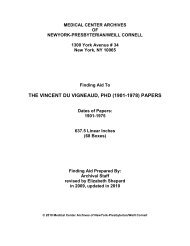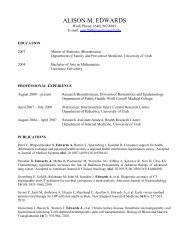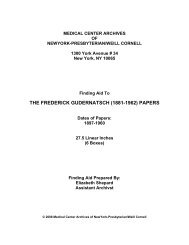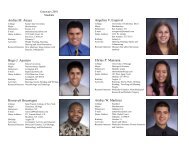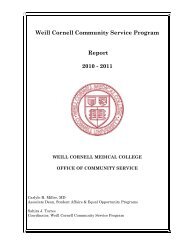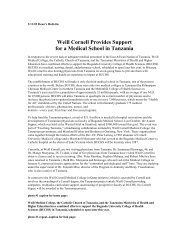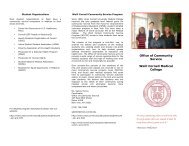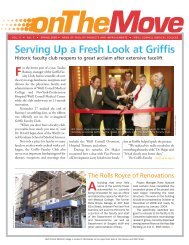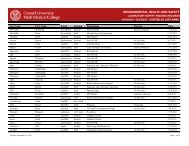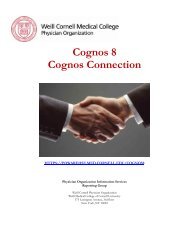Weillcornellmedicine - Weill Medical College - Cornell University
Weillcornellmedicine - Weill Medical College - Cornell University
Weillcornellmedicine - Weill Medical College - Cornell University
You also want an ePaper? Increase the reach of your titles
YUMPU automatically turns print PDFs into web optimized ePapers that Google loves.
In her 2007 book Day of Empire: How Hyperpowers<br />
Rise to Global Dominance—and Why<br />
They Fall, Amy Chua argues that the signature<br />
characteristic of the seven nations and empires<br />
that have risen to global dominance over the<br />
course of world history—Persia, Rome, Tang<br />
China, the Mongols, the Dutch, the British, and<br />
the United States—was tolerance, and that the ultimate<br />
rejection of that principle was the major contributor<br />
to the downfall of all but one of those<br />
hyperpowers.<br />
Chua argues that the willingness of a dominant<br />
culture to accept and even assimilate the<br />
practices, beliefs, and strengths of the populations<br />
it conquers and controls serves only to bolster that<br />
ruling nation. When the rulers eventually seek to<br />
restrict the lifestyles and choices of their subjects,<br />
its decline, Chua asserts, has already begun.<br />
We at the <strong>Weill</strong> <strong>Cornell</strong> Graduate School of<br />
<strong>Medical</strong> Sciences hardly view ourselves as a burgeoning<br />
empire seeking to extend its borders at<br />
every opportunity, but Chua’s hyperpower<br />
hypothesis does strike a familiar chord on our<br />
campus. Besides our world-class faculty and facilities,<br />
the diverse educational and cultural backgrounds<br />
of our more than 300 students could be<br />
this institution’s greatest strength.<br />
Every graduate student here has followed his or<br />
her own path to the doorsteps of our laboratories.<br />
There is no set course agreed upon in advance, no<br />
lockstep method that guarantees success. In addition<br />
to biology, our students have majors in chemical<br />
engineering, electrical engineering, physics,<br />
and chemistry. The <strong>Weill</strong> <strong>Cornell</strong> graduate student<br />
is an experienced, well-rounded individual who<br />
Our Greatest Strength<br />
Scientific curiosity:<br />
PhD student Eli Berdougo<br />
ABBOTT<br />
has tried his or her hand in several arenas of excellence<br />
and will draw upon that well of life experience<br />
to find greatness here.<br />
Take, for example, Eli Berdougo, a fourth-year<br />
student in the Allied Program in Molecular Biology<br />
‘Looking back on all the experiences and<br />
choices that led me here to <strong>Weill</strong> <strong>Cornell</strong>,<br />
I can honestly say that I’ve been happy with<br />
every one of them,’ says Eli Berdougo.<br />
‘This is a great school and a great place<br />
to start a career in science.’<br />
who began his career path at the <strong>University</strong> of San<br />
Francisco with the intention of majoring in engineering.<br />
“Looking back on all the experiences and<br />
choices that led me here to <strong>Weill</strong> <strong>Cornell</strong>, I can<br />
honestly say that I’ve been happy with every one<br />
of them,” Eli says. “This is a great school and a<br />
great place to start a career in science.”<br />
Because of the rich variation in their backgrounds,<br />
our diverse student body develops into<br />
a stronger group of scientists. The Graduate<br />
School is training this pool of highly talented<br />
students in the biomedical sciences and translational<br />
research to become the next generation of<br />
academic scientists.<br />
David P. Hajjar, PhD,<br />
Dean of the Graduate<br />
School of <strong>Medical</strong> Sciences<br />
WINTER 2008/09 5



